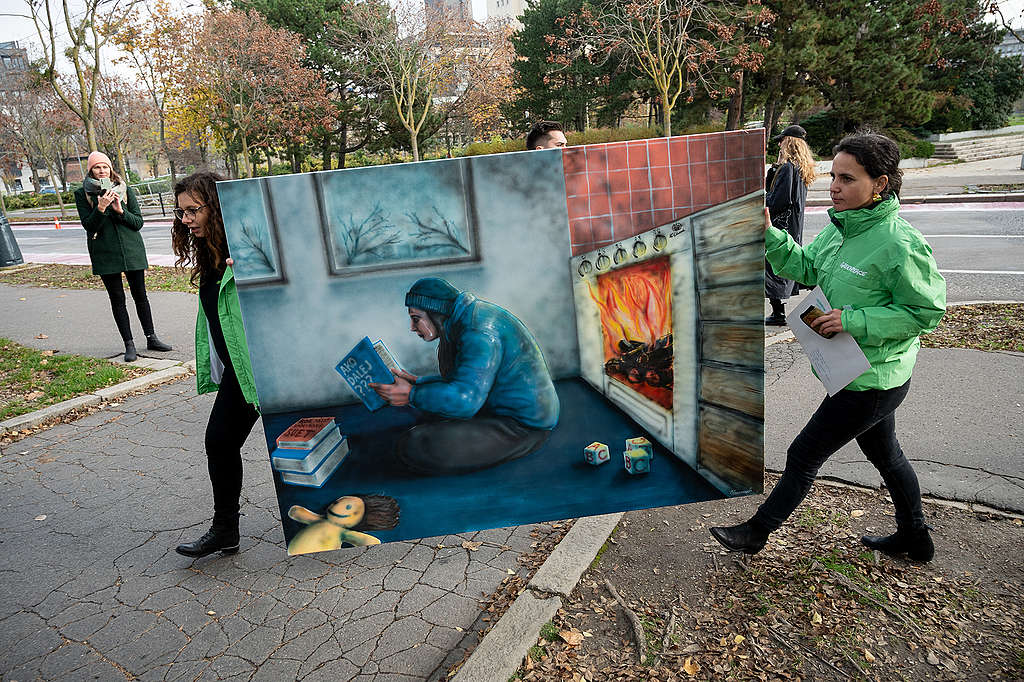
Making record profits and still disconnecting households who can’t pay their expensive energy bills: that is what fossil fuel companies and energy providers are doing this winter.
Silvia Pastorelli is a climate and energy campaigner for the Greenpeace European Unit.
As December approaches, with temperatures dropping and energy prices rising, many of us are facing an anxious wait for our next energy bill. If the upcoming winter is stressful for many, for some it will be a disaster. Imagine: we are in the middle of winter, you couldn’t pay the last energy bill, you are freezing at home and one day, you’re just cut off from your energy. Yes, you’ve just been disconnected, and you will even probably receive a bill for it. It can cost over €130 or equivalent in some European countries.
Cutting people off from their energy supply over winter, a criminal practice
As inhumane as it seems, this situation happens every year in European countries. In 2018, the disconnection rates reached over 4% of household customers of electricity in Italy, followed by Greece with just under 4%. According to an e-survey conducted by the EU in Spring 2022, just after the war in Ukraine started, 16% of people reported being in arrears with their utility bills, reaching as high as 50% in Greece. Overall, 36 million people in the EU were not able to heat their homes adequately in 2020, part of the many more millions of Europeans that suffer from energy poverty.
Energy suppliers have a long history of disconnecting customers who fall behind, even after short notice periods, and the energy crisis we’re in is not stopping them. Millions more people are facing energy poverty this year due to the impacts of the pandemic and Russia’s invasion of Ukraine. With dysfunctional energy markets, rampant inflation and a looming recession for Europe, an increasing number of disconnections for non-payment can be expected this winter, although patchy data means nobody can say for certain how many.
Heat or eat: a terrible choice that can lead to deaths
Because you know, business is business: if you don’t pay, you don’t get energy. No matter the disastrous health consequences. No matter that disconnections due to non-payment lead to hospitalisations and even increased mortality in vulnerable populations. A woman on life support dying because her device lacked electricity in the USA, a couple dying of hypothermia in England, a 12-year old perishing in a house fire in Spain… These are a few examples of the several deaths directly linked to energy disconnections. And many more are possibly going unreported.
Recent disconnections due to non-payment have led to the hospitalisations of clinically vulnerable people, which not only threaten the lives of these individuals, but also put a strain on public healthcare systems. Another example of the impact of energy access on health, a nationwide ban in the USA on utility disconnections could have reduced COVID-related deaths by nearly 15% in 2020, particularly in the Black, Brown and Indigenous communities.
Banning disconnections in the EU would be a simple solution to prevent fossil fuel companies and energy providers from putting the most vulnerable in this infernal spiral. The EU’s gas and electricity laws call for national governments to protect the most vulnerable households from being cut off, but in practice, protection varies massively between EU countries. But although this could be done quickly, successfully and with little obvious negative impact on energy utilities -as the pandemic experience taught us- for now, millions of households are still forced to choose between energy and other basic needs.
People are suffering from the big polluters’ greed and this has to stop
We should call disconnections what they are: needless cruelty. And fossil fuel companies and energy suppliers are responsible for that. Yes, fossil fuel companies are involved: many actors in the fossil power and gas sectors are also among the largest suppliers of energy to households and others. Total, Shell, Eni, Engie and many others are benefiting from fossil fuel trade while also supplying millions of gas and power customers through their subsidiaries.
Letting people freeze to death is not only cynical, this is criminal. And it is even more shocking at a time when these same companies keep making record profits. Fossil fuel producers made $2 trillion windfall profits above their 2021 net income; while the top 20 European utility companies increased their total profits by €57.74 billion, or 11.1% of their total market capitalization, in just over a year.
It’s high time we make polluters pay and protect those who suffer the consequences of this vile game: the people.
